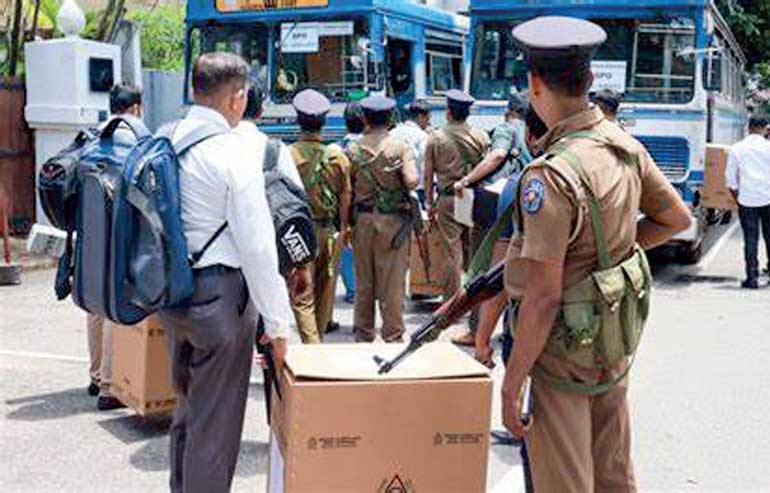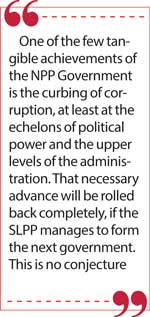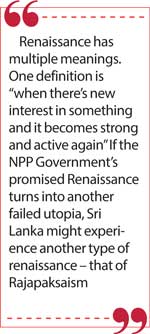Saturday Feb 14, 2026
Saturday Feb 14, 2026
Wednesday, 7 May 2025 00:30 - - {{hitsCtrl.values.hits}}

The NPP/JVP’s victory at the Local Government election was never in doubt. The only doubt pertained to the extent of that victory
“You are in the end – what you are.” – Goethe (Faust)
 By Tisaranee Gunasekara
By Tisaranee Gunasekara
A stranger who returns a misplaced wallet to the owner, contents intact. A professional who saves part of his lunch to feed street dogs. A government official who resolves a citizen’s problem with courtesy and diligence. A maitre d who keeps a braille menu for blind customers. A celebration not of epic heroism but of ordinary decencies indispensable for a better life; and a better country.
This was the point the NPP/JVP was trying to get across to a still sceptical electorate in the run up to the 2024 Presidential election. For, all these exemplary characters lived in the excellent series of ads the party put out for the Presidential poll. Politics yes, but also something bigger than politics. The men featured in these ads (incidentally they were all men, a Freudian slip perhaps) embodied civic virtues and humanitarian values – honesty, decency, responsibility, kindness, consideration. Qualities which spell civilisation.
The owner of the wallet, the friend who watches homeless dogs being fed, the grateful member of the public, the blind customer, all ask a simple question from these exemplary men: Malimaweda (Are you a member of Malimawa)? An understated smile and a small nod is the answer. With subtlety and brevity, a pivotal point is made. These embodiments of civic virtues and humanitarian values are what you will get if you vote for Malimawa.
The NPP’s election manifesto offered a blueprint for System Change; the New Man in the ads showed what this Change will be like.
Renaissance.
Obviously that New Man was not present in any of the buses which illegally parked by the Southern highway on May Day so that their NPP passengers could partake of lunch.
The NPP Government blames old habits, old thinking, and bureaucratic holdout for its inability to deliver. But this act of illegality and unruliness, of stupidity and inconsideration was the work of its own cadres, the very people who are supposed to guide the country and the rest of us into that promised land of Renaissance. (Incidentally, how many LG election candidates were amongst those heedless, irresponsible passengers?)
 The police reportedly turned a blind eye to this illegal conduct, making a mockery of the Government’s boast of establishing the rule of law and equality before law. The real test of such claims is not whether power-holders of yesteryear would be brought before the law (which is a necessity) but whether the law would be used against all miscreants including those who are in power. It’ll be interesting to see what measures the NPP Government and the JVP as a political party take, not just against the police officers who turned a blind eye to a potentially dangerous traffic violation but also against their own cadres who committed that violation.
The police reportedly turned a blind eye to this illegal conduct, making a mockery of the Government’s boast of establishing the rule of law and equality before law. The real test of such claims is not whether power-holders of yesteryear would be brought before the law (which is a necessity) but whether the law would be used against all miscreants including those who are in power. It’ll be interesting to see what measures the NPP Government and the JVP as a political party take, not just against the police officers who turned a blind eye to a potentially dangerous traffic violation but also against their own cadres who committed that violation.
Then there’s the example of the prime minister who told Government supporters how to circumvent election law during the silent period: “We will fall silent in four hours. You don’t have to fall silent. Give a telephone call, say a word while walking on the road, you can do the thing quietly” (https://www.newswire.lk/2025/05/05/paffrel-demands-inquiry-over-pms-election-law-violating-statement/). Her use of that eloquent Sinhala slang shape eke indicates that she intentionally asked her audience to ignore the election law.
This is the prime minister of the republic, possibly even a future president if the NPP/JVP breaks its promise to abolish the executive presidency. The argument that such personal propagandising has always happened is not an excuse. They did and they will; a prime minister advocating such conduct publicly is quite another matter. Imagine how PM Amarasuriya would have reacted if an opposition politician said this.
Will the prime minister apologise unequivocally? Will appropriate legal and disciplinary action be taken against law-breakers on the highway and the enabling police officers? Failing to do so would send a ruinous message to NPP members, the police, and the general public – that behind the rhetoric, the new Government is establishing not the rule of law but the law of the rulers.
Their law.
 Electoral signals
Electoral signals
The NPP/JVP’s victory at the Local Government election was never in doubt. The only doubt pertained to the extent of that victory. Would the NPP better its Parliamentary election performance (at least maintain it) or not?
Between the Presidential and Parliamentary elections of 2024, the NPP/JVP managed to increase its vote in both absolute and relative terms: 1.23 million votes; 22%. Still, if the November turnout had been the same as that of September (79.5%) instead of dropping to a low 69%, the NPP/JVP would have won just a simple majority. But 1.1 million Lankans who voted on 21 September decided to stay at home on 14 November. And those abstaining voters belonged to the anti-government vector. In less than two months, Sajith Premadasa’s SJB lost 3.4 million votes (78%) and Ranil Wickremesinghe’s NDF 1.7 million votes (75%). Hardly surprising given the infantile conduct of the leaders.
Will the SJB and the UNP be able to regain at least some of their lost votes? Or will their votes and vote-share diminish still further?
The performance of the SLPP, led by Namal Rajapaksa, would be another key pointer. The young Rajapaksa is very much the crown prince, a leader not by talents or achievements but by genes. A YouTube video shows him coming down a long flight of stairs to chair a LG election meeting in Moneragala. When his descent is complete, two young men (possibly candidates) worship him, backs and heads bent, hands together. Mr Rajapaksa accepts their veneration as a matter of course, as if it’s his due (https://www.youtube.com/shorts/_BsTCv6H-bY). Obviously, under his leadership, the SLPP would not be transformed into a modern democratic party but continue as a Rajapaksa fief, politically and spiritually.
One of the few tangible achievements of the NPP Government is the curbing of corruption, at least at the echelons of political power and the upper levels of the administration. That necessary advance will be rolled back completely, if the SLPP manages to form the next government. This is no conjecture. At a recent election meeting, SLPP heavyweight Janaka Tissakuttiarachchi spoke proudly of the Rajapaksa strategy of development through corruption: “There is nothing to hide. Some local government members would build a road with their friends and would take a profit of 5,000, 10,000 from those contractors. They didn’t buy a packet of milk for their children with that 5,000, 10,000. They took that 5,000, 10,000 to the funeral and the wedding in the village. And that person built himself. He used the development work given by Mr. Mahinda to build himself up, contest the next election, and win.”

Corruption always existed. But corruption became normalised under Rajapaksa rule. Mr. Kuttiarachchi’s statement amounts to a masterclass in how the Rajapaksas used public funds to build up party loyalists and the party. It is also a clear signal that if the Rajapaksas return, they will enthrone corruption again, making it not just a normal occurrence, but an everyday virtue, a necessary part of development itself.
In 2011, Egyptians got rid of their lifetime president through a largely non-violent mass uprising. In 2012, the country held its only democratic presidential election. The two contestants in the final round were a religious extremist and a functionary of the ancien regime: Mohamad Morsi of Islamic Brotherhood and Ahmad Shafik, a former air force commander and the last PM under Musharraf. Mr. Morsi won, tried to turn Egypt into an Islamic state and was deposed by the army. Egypt’s tragic present illustrates the fate of countries without a moderate democratic opposition able to attract voters disenchanted with the government.
Renaissance has multiple meanings. One definition is “when there’s new interest in something and it becomes strong and active again” If the NPP Government’s promised Renaissance turns into another failed utopia, Sri Lanka might experience another type of renaissance – that of Rajapaksaism.
Caveat emptor
In 2022, the Colombo High Court convicted seven former university students of causing the death of fellow student Samantha Vithanage. In the eyes of his killers, Mr. Vithanage’s crime was his public opposition to ragging.
In November 2022, a group of Sri Jayewardenepura University students opposed to ragging (led by Mr. Vithanage) and members of the JVP-controlled (and pro-ragging) Students Council had held a discussion about ragging. “Midway through the discussion, a mob of around 200 JVP supporters armed with clubs and stones stormed into the room and viciously attacked Vithanage and others in the anti-ragging camp” (https://groundviews.org/2009/11/30/ragging-in-our-universities-a-symptom-or-a-disease/). The mob also used shards of glass. A computer monitor was dropped on Mr. Vithanage’s head when he lay prostrate on the ground. He was admitted to the hospital and died two days later.
When the verdict was given, Samantha Vithanage’s mother, a retired schoolteacher, stared at the accused on the dock and recalled that her son had “76 injuries, his skull fractured into tiny pieces, and all limbs broken” (https://ceylontoday.lk/2022/06/11/samanthas-verdict-a-watershed-moment/). Had the New Man of the NPP election ads been around, he would not have been among the barbarous attackers; he would have tried to protect the defenceless victim.
 Today the NPP Government says it is unequivocally opposed to ragging, as does the Inter University Students Federation (IUSF) currently controlled by the JVP-breakaway, Frontline Socialist Party (FSP). The only questions are will the NPP walk the talk and will the FSP allow an actual clamp down on ragging? Left to their own devises, the Government is unlikely to do much, partly due to its own ineptitude and partly due to pro-ragging holdouts within its own ranks. It is up to the society at large to push the Government into taking concrete steps to end ragging by using the law without fear, lethargy, or favour, including against its own student leaders and supporters if necessary. Perhaps apologising to Priyantha Vithanage’s family would be a good place to begin; it will definitely send a strong signal that the NPP Government is serious about combatting ragging.
Today the NPP Government says it is unequivocally opposed to ragging, as does the Inter University Students Federation (IUSF) currently controlled by the JVP-breakaway, Frontline Socialist Party (FSP). The only questions are will the NPP walk the talk and will the FSP allow an actual clamp down on ragging? Left to their own devises, the Government is unlikely to do much, partly due to its own ineptitude and partly due to pro-ragging holdouts within its own ranks. It is up to the society at large to push the Government into taking concrete steps to end ragging by using the law without fear, lethargy, or favour, including against its own student leaders and supporters if necessary. Perhaps apologising to Priyantha Vithanage’s family would be a good place to begin; it will definitely send a strong signal that the NPP Government is serious about combatting ragging.
(The SLPP might offer Gotabaya Rajapaksa’s Leadership Training Programme model as a solution to ragging. That certainly was what Mr. Rajapaksa claimed. In reality, the students did not escape ragging. They got ragged twice over, first in the military camps, and then in the university. The true nature of the Leadership Programme can be best understood by an accident which took place in November 2014. A female university-entrant fell off a seven-foot wall and suffered spinal injuries. When questioned by the BBC, the army spokesman said the wall was just six feet high. Be that as it may, what has ‘leadership training’ got to do with jumping from high walls? The possibility that this program actually gave the participants ideas about even more degrading, dangerous and inhuman ways to torture the next batch cannot be ruled out.)
Lankan universities today are not just torture camps; they are also hotbeds of intolerance and mires of backwardness, the antithesis of Renaissance. In July 2016, the Alumni Association of the University of Peradeniya planned to stage Kaushalya Fernando’s drama ‘Dutu Thena Allanu’, an adaptation of Nobel Laureate Wole Soyinka’s Opera Wonyosi at the Ediriweera Sarachchandra Open Air Theatre (the legendary Wala). That plan had to be cancelled because a group of students – who presumably have never heard of Wole Soyinka – objected on the grounds of morality and culture. The same year, violence broke out in the University of Jaffna because the Tamil students opposed the inclusion of a Kandyan dance in a cultural festival.
In 2022, the dean of arts faculty of the Peradeniya University revealed that students studying in the English medium are banned by the Students Union from using common facilities such as the canteen.
Some years ago, a group of seniors in the Kelaniya University tried to ban new female students from wearing trousers. They probably considered trousers Western, ignorant of the fact that the oldest known trousers were found in Asia, in an ancient Chinese cemetery (https://www.sciencenews.org/article/first-pants-worn-horse-riders-3000-years-ago). These bastions of nativism and religio-cultural purism are far more reactionary and retrogressive than the larger Lankan society. And they are churning out the country’s future public servants (including doctors and teachers).
Proudly ignorant and violently intolerant, these products would be the antipode of the New Renaissance Man the NPP portrayed in its election ads.
Buyer (including of political dreams) beware.